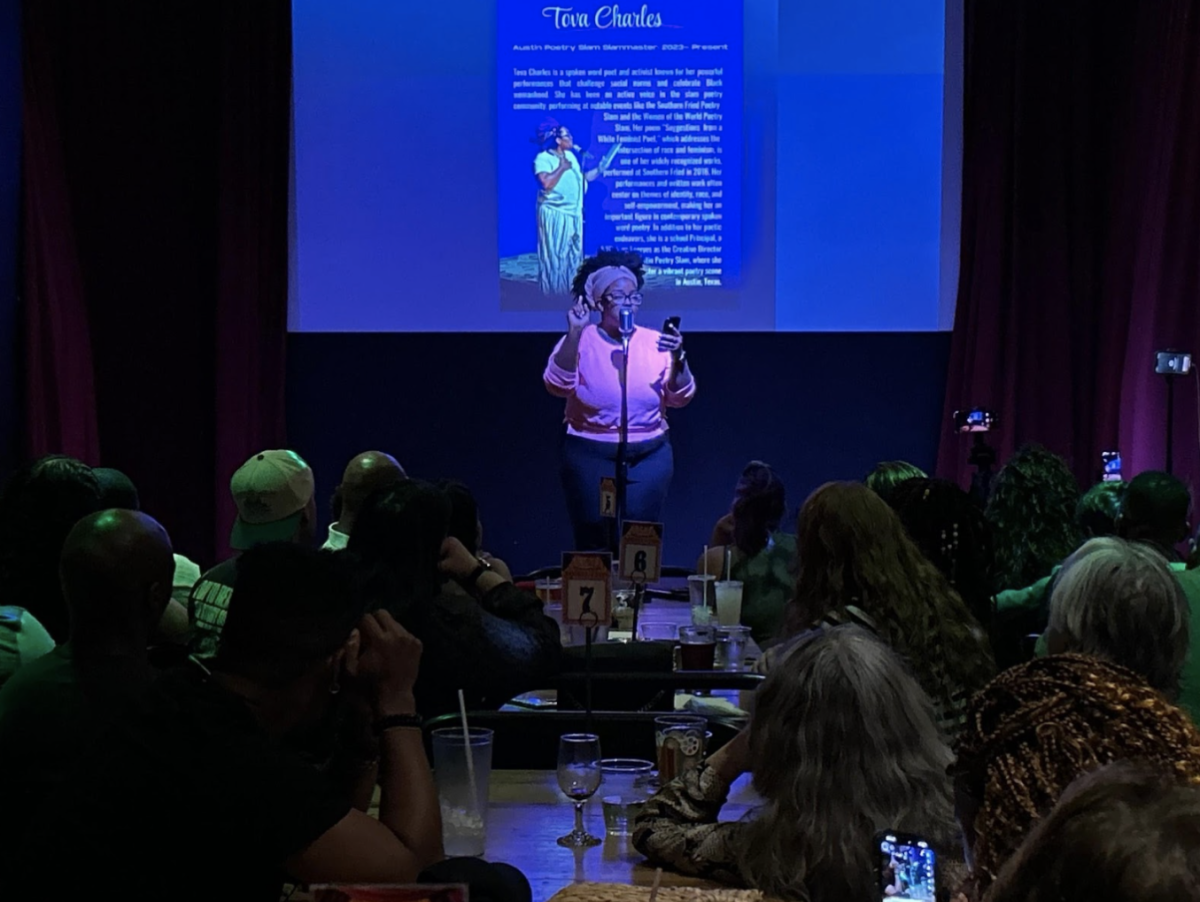Mueller’s small Barrel O’Fun flooded wall to wall with creatives on October 9 for Austin Poetry’s Slam’s Slam Champion Showcase, a 30th anniversary celebration featuring the most impactful poets in the organization’s history.
Situated directly beneath Alamo Drafthouse Cinema, the room buzzed with echoed coos and snaps as Tova Charles teared up listening to audio of her younger self reciting a competition poem play over the speakers.
Charles is the creative director and CEO of Austin Poetry Slam, which celebrated its 30th anniversary with a showcase of 12 past slam champions and “slammasters,” or hosts. The show included a treasure trove of notorious performance videos and pictures, stories and long-retired poems recited by their acclaimed authors.
“We’re one of the original poetry slams in the county, so just to have that type of history, it should really be celebrated,” Charles said.
Poetry slams are elimination-style competitions in which judges score poets’ original spoken word pieces, advancing through multiple rounds until a winner is chosen.
Austin’s slams began as qualifiers for a chance to perform at 1994’s Lollapalooza festival dates in Houston and Dallas and quickly found a weekly home at Electric Lounge through first slam master Mark Henry.
Henry joined Austin’s first slam team in 1995, consisting of the season’s top scoring poets who performed annually at the National Poetry Slam against other teams from across the country.
“We saw our story was repeating itself all over and it changed everything,” Henry said to the audience during the showcase. “We were so excited to get back and spread the word.”
Jomar Valentin, who was a University of Texas freshman new to the slam scene in 2009, first heard the word about Austin Poetry Slam through its sister organization, Austin NeoSoul. By the time he attended his first Austin Poetry Slam event, it was larger and more competitive than ever after a national finals appearance the year before.
“It was scary but also inviting, because the people there were so encouraging,” Valentin said. “I’m very fortunate to have started at the same time as Tova because we helped each other as we grew up, being coached and mentored in that community.”
Valentin first joined the team in 2011. The role enabled him to travel the country for national slams and later endeavors including a featured performance during New Mexico Pride. The close bonds he formed kept him involved with Austin Poetry Slam for nearly 15 years, during which he became champion in 2014 and served as a slammaster from 2015 until 2023.
He said even the challenging experience of reaching new audiences as the COVID-19 pandemic limited the organization to virtual events on social media was worth the reward of seeing the entire community reunited and thriving at their 30th anniversary celebration.
“I’m impressed every time I go,” he said. “I’m just like, ‘This is still alive, and I’m glad there’s a place for it to keep on breathing again. It felt really wild to get the anniversary call, and it was an automatic yes.”
Austin’s poetry community has been productive in establishing new outlets for expression this year. The city is seeking its first poet laureate after Austin City Council approved the position’s creation in May. Additionally, Torch Literary Arts, a nonprofit for female and nonbinary writers of color founded by Texas Poet Laureate Amanda Johnston, hosted Irish poets Nithy Kasa and Felispeaks in October for its first visiting writers’ series event in partnership with Texas State.
Although the National Poetry Slam ended in 2018, Charles’ next step is planning for this year’s slam team to compete in the regional Southern Fried Poetry Slam in Louisiana. Beyond that, she has equally ambitious hopes to return a poetry festival and a youth poetry slam to Austin.
“Sometimes we just hone in on pure love for the art, but don’t think about how to create systems that will make it sustainable for people to do,” she said. “We are historical landmark of Austin, and we need generations after us to be able to still celebrate this work.”
Overall, Charles wants Austin Poetry Slam to remain inviting for anyone, regardless of whether they write poetry competitively or at all, who wants to be a part of the expressive space she cultivates every Wednesday night.
I don’t want to make anybody feel like you have to be in slam,” she said. “The slam community is just a title, but the people are what makes it unique and special.”
































